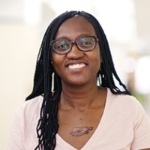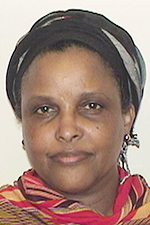School of Social Work Assistant Professor Saida Abdi will present a research symposium, “Culturally and Linguistically Appropriate Virtual Engagement Methods for African Immigrants: Examining of African Immigrant and Refugee Communities Healthcare Access during the COVID-19 Pandemic,” on Wednesday, April 20, from noon to 1 p.m.
COVID-19 has highlighted health disparities consistently experienced by Black communities. However, disparities experienced by African immigrants are too often subsumed in data for all Black/African Americans. Several factors place African immigrants at greater risk of both acquiring coronavirus and experiencing severe symptoms or death: working high-contact jobs as essential or frontline workers, living in high-density housing, stigma, lack of culturally and linguistically appropriate information, and fears related to immigration status.
Abdi and colleagues received a grant from the National Patient-Centered Outcomes Research Institute (PCORI) to determine culturally and linguistically appropriate methods for African immigrants to receive health care virtually. The team developed a community-based participatory research project aiming to build the capacity of African-led organizations to conduct patient-centered research during the COVID-19 crisis. The project documented the experiences of African immigrant patients in accessing and using virtual platforms.
Abdi will present her findings, along with Anisa Ali, the program director and cultural broker for the Somali American Parents Association, and School of Social Work PhD student Ndilimeke Nashandi. They will share recommendations to engage African immigrants through virtual platforms while also offering lesson learned to aid future research partnerships.
Bios:
Anisa Ali is a program director and cultural broker for the Somali American Parents Association. Her work focuses on training educational support staff to serve students ages 14 to 21 through individualized educational plans and pre-employment transitional services. Over the past decade, Ali has worked to support Somali families who have children with disabilities to navigate the American education system.
Ndilimeke Nashandi is a PhD candidate and research assistant in the School of Social Work. Her research interests include culturally responsive child welfare services and the academic achievement of girls. Over the past decade, Nashandi has worked to strengthen community systems, increase funding for organizations working in the HIV field, and strengthen collaboration between higher education institutions and civil society organizations.
Saida Abdi is an assistant professor in the School of Social Work. Her research focuses on factors related to resilience among refugee and immigrant children and families and the use of community based participatory research. Over the past decade, Abdi has worked to build community partnerships to increase mental health knowledge and services in diverse refugee communities focusing on children and families impacted by violence and migration.






